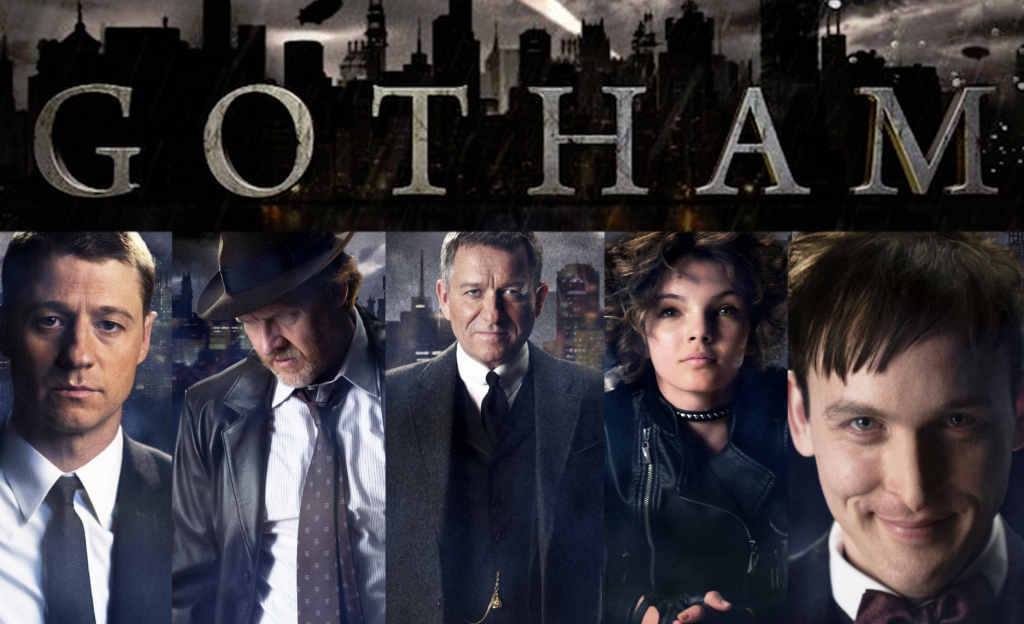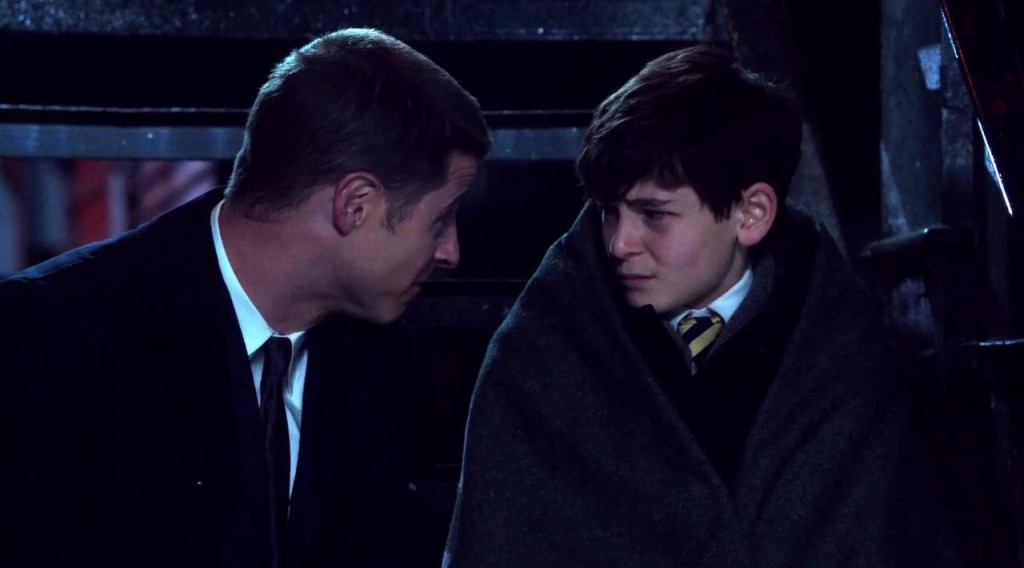Genre: Drama/Noir/Superhero?
Premise: When a wealthy couple is gunned down in front of their son, a man named James Gordon, one of the only honest cops in the city, attempts to solve the case.
About: This FOX project is, if not the flashiest, definitely the most high profile new show on the 2014 fall television docket, with its direct tie-in to the Batman mythology. Writer Bruno Heller is best known for creating the extravagant HBO show, Rome, along with CBS’s The Mentalist. Heller comes from prime screenwriting stock. His father, Lukas Heller, is the author of several movie classics, including “What Ever Happened to Baby Jane?, The Dirty Dozen, and The Flight of the Phoenix. Gotham will include a large cast of characters played by, among others, Ben McKenzie (James Gordon), Jada Pinkett-Smith (Fish Mooney) and Donal Logue (Harvey Bullock – Gordon’s partner).
Writer: Bruno Heller
Details: 59 pages (2nd Revised Network Draft)
You can’t talk about FOX’s Gotham without mentioning ABC’s Agents of SHIELD. This is the new creative world we live in, where pre-established universes are going to take precedence over original ideas. This has always been a movie thing, but now with the whole “universe” approach, it’s becoming more of a TV thing.
Taken at face value, I like the idea. As writers, you’d hope that your fantasy (or science fiction or period piece or superhero comic) screenplay is deep enough to host a vast network of stories. If the people in your script are so singular and so uninteresting that they’re only capable of telling a single tale, you’d think you haven’t built in a deep enough mythology.
But if Agents of SHIELD is any indication of what we’re to expect from this new “Universe” approach, we can safely assume that the translations will be anything but easy. I’m sorry, but that show stunk.
Part of the problem when you’re writing this kind of material is that you’re beholden to the expectations of an audience who wants to see its star characters. Common sense says that once you take the super heroes out of a super hero universe, you don’t have much left. So the shows scramble to include super hero cameos or references to super heroes or fringe super heroes to fill in the gap.
But therein lies the problem. You can’t depend on gimmicks to keep audiences engaged in the long run. The show has to be good on its own. That’s what I went into Gotham wondering. Could it prove itself to be a good enough show on its own merit? Or, more importantly, would it even try? Let’s find out together…
26 year old James Gordon has just been fast-tracked to homicide detective in the crime-ridden city of Gotham. Gordon has a dream backstory. His father was a captain in the force. He’s a war hero. He’s a good man who wants to do the right thing.
Which doesn’t mesh well with the city he got his job in. In Gotham, tough guy criminals like Carmine Falcone are the ones who make things go round. Not police chiefs or mayors. Gordon is about to find that out the hard way.
One night, a little kid named Bruce Wayne is walking with his billionaire parents after a movie. A low-life steps in, demands their money, then shoots the husband and wife before fleeing. Gordon and his experienced (and notably less idealistic) partner Harvey Bullock are assigned the case.
Sexy nightclub owner and friend of Bullock, Fish Mooney, fingers a local thug as the killer, who they end up killing during a rooftop chase, and it looks like the case is solved.
Or is it? Gordon isn’t so sure and starts looking deeper. He finds that Fish Mooney planted the damning evidence on the local thug. When he comes to her with this theory, she beats him to a pulp and drives him to her warehouse of nightmares. But at the last second, none other than crime boss Carmine Falcone saves him.
Falcone tells Gordon that he likes his chutzpah, but that the way things work in Gotham isn’t always black and white. He admits that the local thug wasn’t the killer, but that tabbing him as such was a necessary evil to keep the city happy. He tells Gordon that the best thing for him is to get on board and play the game. Any other option is going to result in… not so pleasant circumstances.
And thus the roadmap for Gotham is laid out. Will Gordon play the game? Or will he fight for justice?
Gotham was better than I thought it would be. During The Dark Knight trilogy, the most boring scenes were always when they focused on Gordon. But I realize now it’s because they couldn’t give him enough time to truly shine. And honestly, how do you shine in a Batman movie if your name isn’t Batman or The Joker?
Now that Gordon is the focus, we get to know him a lot better. And gosh dangit if I didn’t like the guy. Heller uses one of the oldest yet most obvious tricks in the book to make you like his hero. He makes him a good person! There’s no saving the cat here. We just see from the outset that Gordon wants to do good in a bad world. How do you dislike somebody like that?
There’s a great screenwriting trick to highlight this called “comparative actions.” Early on, when Gordon and Bullock are looking for a lead, they go to Fish Mooney’s nightclub. Once there, they hear Fish’s thugs beating up some poor schlub in the alley.
Bullock casually talks with Fish as the screams continue, while Gordon gets antsier by the minute. There’s clearly a crime going on but his partner isn’t doing anything about it. Finally, Gordon can’t take it anymore and goes out to the alley to check it out.
This is comparative action. Just like that, we understand where these two guys stand. And as an added bonus, it makes us like Gordon a little more. He’s always going to look out for the little guy. He’s always going to fight crime.
What most surprised me, though, was that I actually cared about this case. And not because it was Batman’s parents. I cared because the more Gordon looked into it, the more it looked like there was a conspiracy involved, that this wasn’t just a random crime, but a calculated hit in order to redistribute power in the city. I wanted to keep reading because I wanted to know what the damn conspiracy was. I was hooked!
Now I have to admit, I don’t know if this is how the origin of Batman goes. But assuming the choice was an open one, I know that a lesser writer probably wouldn’t have made it a conspiracy. He would’ve used the investigation to simply introduce us to Gotham and all the characters. At the end of the episode, then, we probably would’ve caught the bad guy. The fact that this went higher up was both intriguing and set up that essential “long-running question” that a TV show needs to keep viewers coming back. Who killed Bruce Wayne’s parents???
Gotham started off today as a show that had my curiosity. It now has my attention.
[ ] what the hell did I just read?
[ ] wasn’t for me
[x] worth the read
[ ] impressive
[ ] genius
What I learned: The coolest thing about this script is how it made its bad guy GOOD in order to make him BAD. Remember screenwriters, the obvious choice is to make your bad guy a big bad meanie. But that usually feels obvious and boring. When Carmine Falcone, Gotham’s biggest criminal boss, is introduced, he isn’t introduced killing someone or beating up our hero. He’s introduced SAVING our hero! Then having a nice pleasant conversation with him. The genius of this? He saved Gordon so he could be an even bigger bad guy. He needed to be good to be bad. By now having Gordon on his side, it allows him more control over the city. It’s evil and manipulative, but most importantly, it makes him a way more interesting bad guy than had he just acted bad.



